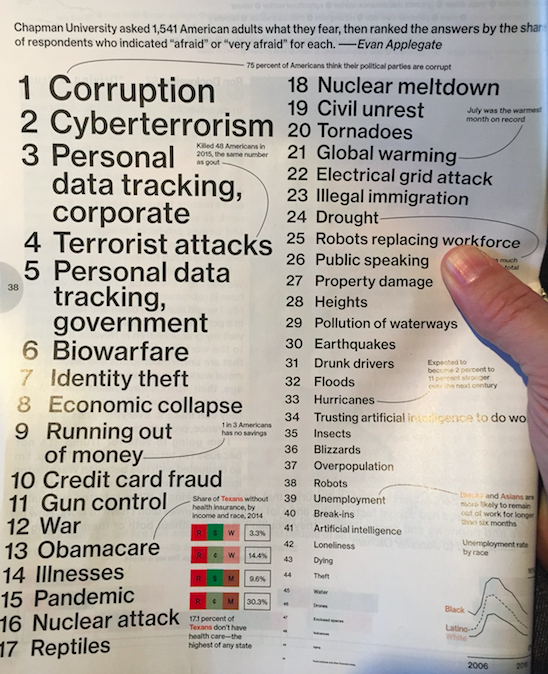
On a plane from Omaha where I had just delivered a speech I read an article in Business Week where they reported on a study by Chapman University about the things that Americans feared the most.
It was a long and depressing list of threats, from fear of corruption (number 1) to fear of cyberterrorism (number 2) and fear of personal data tracking (number 3) to fear terrorist attacks (number 4) and so on. (Americans are afraid of a lot of scary things that are statistically very, very unlikely to hurt them.)
What I found absolutely amazing is that the ONLY thing on this list that was actually a choice – meaning something that a person can choose to do or not do to! – was “the fear of public speaking”! (and perhaps also “heights”.)
“Fear of public speaking” came in at place 26 just after “fear of robots replacing the workforce” and just ahead of “fear of property damage”.
The more I look at this list the more amazed I am by it.
There is this saying that people are “more afraid of public speaking than they are of dying” – something I always thought must have been an exaggeration – but according to this survey it turns out to be true! (Fear of dying came in at 43…)
As someone who makes a living speaking in public I can not for the life of me understand where this fear comes from – but I think it is good for speakers to be aware of how traumatic and stressful the act of public speaking is for most people.
Being conscious about how afraid most people in the audience are about what we as speakers do on stage helps to explain the un-proportionate positive reactions that speakers tend to get for our work – like why we get long, applauses after standing on a stage talking when people who do really dangerous or difficult work (like fighting corruption, terrorist attacks or nuclear meltdowns, for example) tend not to get applause after their workday is over.
The reason audience is giving such positive feedback to speakers is because they are so happy it was not them having to be up there.)
The fact that many people just hate to speak in public is of course a good thing for us who love to do it – it means that there is much less competition for the speaker jobs that we love to get.